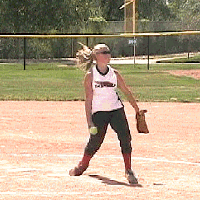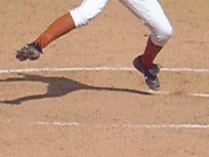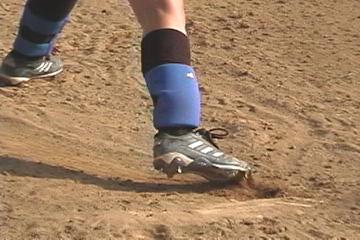|
by Gerald Warner,
Softball Pitching Instructor


There are three often-violated
rules in girls' fast pitch softball that are misunderstood by many
pitchers, coaches, and even some umpires, and consequently are often
not enforced. All three
were designed to prevent some pitchers
from having an unfair advantage over other pitchers…and
batters. These two definitions and rules for "leaping"
and "crow hopping" are often misinterpreted, and wrongly used to
define each other. What we offer here is an attempt to clarify
the meaning of the three rules so they can be more uniformly
understood and complied with:
1) A CROW
HOP is not the pitcher's failure to drag the
push-off foot along the ground. A crow hop is, as the
name implies, a forward hop or step off the pitching rubber by the
pivot/push-off foot (typically moving it forward a foot
or more) to "replant" it and use it for a second push-off
point. It is not permitted in girls/womens
softball.
In their rulebooks, the USSSA, ASA,
etc. offer essentially the same definitions for "crow
hopping":
ASA - "A crow hop is
defined as the act of a pitcher who steps, hops, or drags off
the
Front
of the pitcher's plate, replants the pivot foot, establishing a
second
impetus
(or
starting point), pushes off from the newly-established starting
point and
and completes the
delivery."
And the ASA rulebook also
states:
"Pushing off with the pivot foot from a
place other than the pitcher's plate is
illegal."
USSSA - "A crow
hop is the replanting of the pivot foot prior to delivery of the
pitch."
Additionally,
under USSSA Pitching Rules:
"Pushing off
with the pivot foot from a place other than the pitcher's plate is
illegal.
NOTE 1:
It is not a step if the pitcher slides (her) foot in any direction
on the pitcher's plate,
provided
contact is
maintained.
NOTE 2: Techniques such as the "crow hop" and "the leap" are
illegal." 
2)
LEAPING can be caused by a failure to "drag"
the pivot/push-off foot. Leaping, in fast pitch softball, is
the act of having both feet off the ground at the same time (as
shown in the photo on the right).

Therefore, the pivot/push-off foot
usually is dragged along the ground until the stride foot
lands (leap-with-drag pitchers) , or remains in contact with the pitching
rubber (for some stepping-style pitchers).
Again, here are the more official
definitions:
ASA
-
"LEAPING. (Fast Pitch
only) An act by the pitcher
which causes the pitcher to be
airborne
on the
initial move and move from the pitcher's
plate.
"Additionally, under the ASA Rulebook Pitching Regulations
for Fast Pitch Softball:
"Pushing off and dragging the pivot foot in
contact with the ground is required. If a hole has been created,
the pivot foot may drag no higher than the level plane of the
ground."
USSSA -
"A LEAP is when both feet are
airborne."
Further, the USSSA's
Pitching rules state:
"The pivot foot may remain
in contact with or may push off and drag away from, the
pitching plate prior to the front foot touching the ground, as
long as the pivot foot remains in contact with the
ground."
3) SIDE STEPPING is
permissible, but as long as the stride foot lands within the
"pitching lane". Some pitchers, particularly those who are
stepping-style pitchers, are often taught to not step directly
forward toward home plate, but instead to step to the side to gain
an advantage with the "closing" (or twisting of the
trunk) process. Stepping to the side must be restricted
to the width of the pitching plate. Here is the ASA
rule:
ASA - "In
the act of delivering the ball, the pitcher must take one step with
the non-pivot
foot
simultaneous with the release of the ball. The step must be
forward and toward
the
batter
within the 24 inch length of the pitcher's
plate."
If you have questions or need more
information
E-mail us, or call Pitching Instructor Gerald
Warner in Colorado at (720) 200-4575
Home Page | | About Us | E-Mail
Us
Other Articles for Coaches and Parents
| Beginning Pitchers | 1st & 2nd Year
Pitchers | Experienced
Pitchers | 






